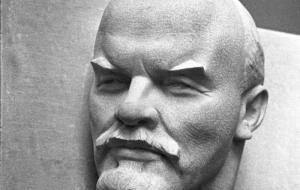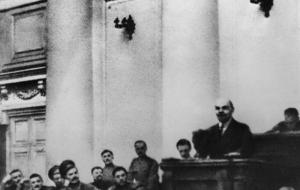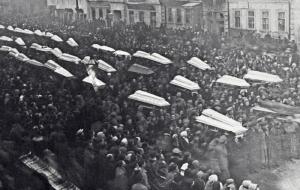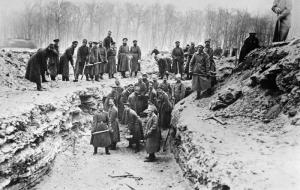April: Lenin arrives home, mass burials held amid jubilation
On April 5, across major cities that participated in the revolts – from Samara to Helsingfors, people are simultaneously mourning and celebrating. Public burials for the victims of the fighting are taking place, but they carry a celebratory, almost ecstatic mood – people are celebrating the end of tsarist rule and recognizing the sacrifice it took to get here. Hundreds of thousands people are out on the streets. This occasion is important, for it shows how the ‘cult of the fallen’ was instrumental to forming the symbolic core of Bolshevism and the future success over its political rivals.
Russia now falls into a period of Dual Rule. The Petrosoviet knows it has the complete support of the country’s working class, but prefers to leave the bureaucracy to the Provisional Government. Vladimir Lenin comes back to Petrograd in mid-April from exile in neutral Switzerland. He will seek to deliver his April Theses, calling for the soviets (councils) to take power from the liberals and social revolutionaries at the Provisional Government, and for the Bolsheviks to denounce the government. The April Theses will lay the foundation for what became known as the doctrine of Leninism.
Meanwhile, the Provisional Government refuses to end Russia’s participation in the World War – one of the main demands laid down by the February Revolution in Petrograd. However, the Germans hope that Lenin’s return will cause further instability back home, and ensure that Russia pulls out of the war, allowing Germany to concentrate its efforts on France and Britain.


April 5, 1917
A funeral procession for the victims of the revolution and violent clashes with the police and troops will be held at the Champ de Mars in Petrograd. Up to 1 million people have registered to participate in the funeral march and mass rally.
German troops are completing withdrawal to the Hindenburg Line, a new well-fortified defensive position on the Western Front in North-Eastern France.
The Petrograd Newsletter
Apartments for Released Political Prisoners
The Committee for Released Political Prisoners requested the city hall to prepare apartments to accommodate former political prisoners who were released to freedom by the new free Russia. The city will pay all fees for these apartments for the first six months.


April 6, 1917
The Entente alliance grows as the United States officially declares war on Germany, following an overwhelming majority vote in the Senate. There is hope that the US, which hasn’t borne years of sustained fighting and a drain on its resources, will play a decisive role.
Two days later Austria-Hungary will sever diplomatic ties with the United States.
April 10, 1917
The Bolshevik party is travelling from Gottmadingen to Sassnitz. Their journey will take them through all of Germany, up through Frankfurt and Berlin, before they reach their destination.
Meanwhile in Petrograd, the Provisional Government issues a new decree that states that any bread surplus will from now on be placed in its hands. The task of redistribution will fall on the shoulders of local government bodies, a statement reads, adding that it will also go for a fixed rate.
The statement also brings up the need to do the same with staple items like iron, textile and kerosene. It makes a proposal to reduce the new fixed prices from previous ones.
“In so doing, the Government hopes that the new law will become the first serious step on the way to reordering the economic life of the country, disrupted during the war with help from the foolish management of the old rule.”
Over in the UK, HRH King George V cancels Nicholas’ invitation to England in light of the potential public backlash. This is done despite the friendship between the two – not to mention the fact that they are cousins.
April 13, 1917
The RSDLP’s Georgy Plekhanov is back in Petrograd. Plekhanov is a prominent philosopher and party member, who authored numerous texts on Marxism. Vladimir Lenin has always considered his texts “the best in the international literature on Marxism.”
It was Plekhanov who famously said during the 2nd meeting of the RSDLP: “If, in the interest of the success of the revolution, a limitation inherent to one or another democratic principle required temporarily sidestepping, it would be a crime to allow this to become a stumbling block.”
Plekhanov has spent 37 years in exile abroad. Although he was welcomed at the Finlyandsky station by Ckheidze and Tsereteli, it has been made clear that he will not be rejoining the Executive Committee, owing mostly to his pro-war stance.
April 16, 1917
In an atmosphere of uncertainty, Vladimir Lenin and his comrades reach Petrograd, back from a decade-long exile. He is prepared to lead the Russian Revolution. After March’s events, the Germans allowed Lenin to cross their territory from Switzerland en route to Sweden in a sealed railway car. Berlin is hoping that Lenin’s return to Russia will lead to political unrest and undermine Russia’s position on the front lines. This is after the Provisional Government makes clear it is not pulling out of the war.
Abroad the war continues. By April 16, the German campaign of all-out marine warfare sinks 110 vessels. The day before the Germans have sunk Britain’s Cameronia, transporting soldiers. There were 2650 aboard, 210 of whom have perished.
Mutiny grips French troops. France has been experiencing numerous setbacks in its fight against Germany. Coupled with no relief, the French simply do not think they can progress. The loss of all faith in the French command peaks on April 16, when French General Robert Nivelle, having been appointed commander, decides to proceed with a plan he reportedly knows is ill-conceived. Thousands of French troops are sitting in trenches at Chemin des Dames, afraid of being mowed down by German machine guns. The desperate plan by the commander is to decimate German lines with French artillery shells and then charge them, emerging from the trenches. The plan is a massive failure – not least because the Germans have reportedly caught wind of the strategy.
On April 16, 30,000 French soldiers leave the trench and lose their lives to German guns within several hours – one of the bloodiest slaughters in the history of all human wars. At the same time, the Germans knew that French artillery would be targeting their trenches, and escape to secondary ones. The French end up bombing empty trenches.
By April 26, repeated attacks concocted by Nivelle result in the deaths of 120,000 French troops, all lining No Man’s Land. This is the ‘Second Battle of the Aisne’.
The French Army by that point feels almost entirely disconcerted with its military progress, and by the end of April, after numerous failures by Neville, thousands of French troops refuse to leave their trenches, disobeying orders.
France does its best to hide the mutinies from its allies.

April 17, 1917
Lenin delivers his April Theses at two meetings of the All-Russia Conference. They will subsequently be published in Pravda, which serves as a vehicle for the Bolshevik leader’s writings. The theses are aimed at Lenin’s supporters, and propose to fight the bourgeoisie and oppose the Provisional Government for its failure to make good on its promises, as well as for staying in the war. Another important point is Lenin’s belief that the Revolution is now in its second phase – meaning that the power should now seek to be concentrated in the hands of the workers and peasants.
More importantly, Lenin seeks to put the workers at ease by calling for salaries of political officials to be slashed and “not to exceed the average wage of a competent worker.”
Another point was the confiscation of landed estates and nationalization of all lands. New Soviets with a focus on poor peasants would be set up. Furthermore, all national banks would henceforth be unified into a single one.
April 25, 1917
A law concerning organized public gatherings is put into place. The decree has been long in the making, ever since the anti-bourgeois revolution of 1905-1907. This becomes the first democratic-sounding legal document to come out of the new government. It mandated that “All Russians without exception have the right, without any prior consent, to organize public gatherings indoors and outdoors.”
However, later, it would transpire that the law was not observed in practice to the same degree as it was on paper. On July 4, 1917, in three months’ time, a Petrograd demonstration comprised of half a million people demanding that all power pass to the Soviets will be held. Instead of sticking to its promises, the Provisional Government will forcefully disperse the protesters. Some 56 people will be killed, more than 650 wounded.
-
1 April
-
5 April
-
6 April
-
10 April
-
13 April
-
16 April
-
17 April
-
25 April